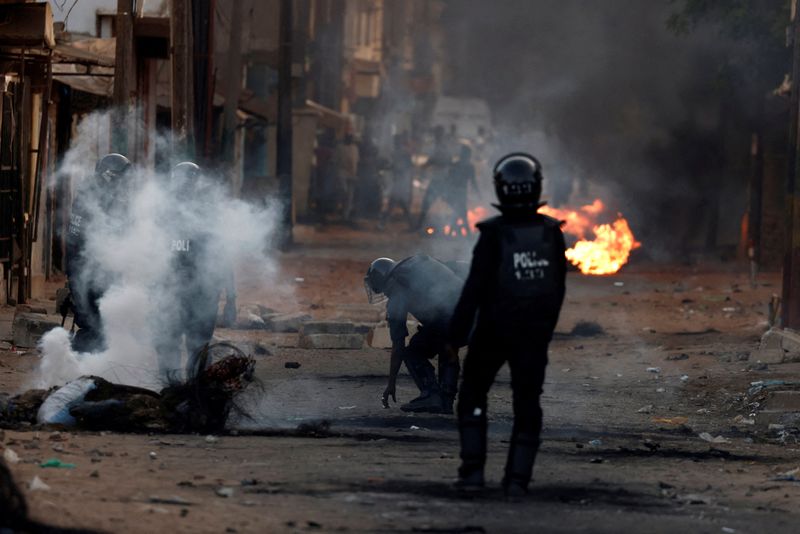DAKAR (Reuters) -Senegal has temporarily closed its consulates abroad following attacks on diplomatic missions in Bordeaux, Milan, Paris and New York among others, the foreign affairs ministry said on Tuesday.
The closures were announced in the wake of deadly unrest that broke out after a leading opposition figure, Ousmane Sonko, was handed a two-year jail sentence last week that is likely to prevent him from running for president in elections next year.
At least 16 people were killed and hundreds injured as protesters clashed with security forces on Thursday, Friday and Saturday, making it the worst unrest to hit the West African country in decades.
Private and public structures and businesses were looted and destroyed during the riots, including university buildings, petrol stations, banks, supermarkets, administrative buildings and bus stops.
Access to mobile internet services, which the government restricted over the weekend, was restored on Tuesday following three days of calm.
The foreign affairs ministry did not link the attacks that justified provisionally closing Senegal's consulates to Sonko's sentence or the ensuing violence.
"This precautionary measure was taken following a series of aggressions ... that caused serious damage," it said in a statement.
The general consulate in Milan was hit particularly hard, with passport-making machines and identity cards destroyed, the ministry said.
Services will resume once working materials and security are restored, it added.
Italy's public broadcaster Rai News reported an assault on Milan's consulate on Monday during which it said around 40 Sonko supporters gathered outside the building with flags and anti-government signs.
They broke in and ransacked the premises, attacked the consul general and started a fire before police intervened.
Videos on social media on Friday showed a small group of protesters in Paris throwing flour at a Senegal embassy car and its passengers. Reuters did not verify the footage.
Sonko's Pastef party has repeatedly urged supporters to take to the streets in strongly worded statements that have also called on the diaspora to join the "resistance."
The legal issues embroiling Sonko first triggered protests in 2021, when he was briefly detained on rape charges he and his supporters denounce as a political ploy to prevent him from running. The government and justice system deny this.
Judges cleared him of rape last week but found him guilty of "corrupting youth" as the accusations involved a woman who was 20 at the time.
Sonko, who has become the face of growing frustration against President Macky Sall, is appealing the outcome of a separate libel case that could also hinder his political intentions.

Rights groups have accused security forces of using excessive force and firing live ammunition rounds at demonstrators, which they deny.
Professional league football matches were suspended until further notice on Tuesday due to the security situation, the national football federation said.